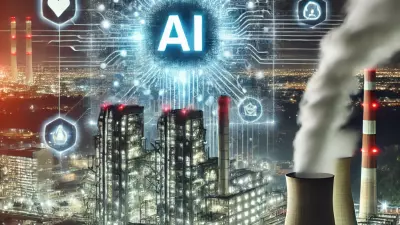In mid-July 2022, the Pittsburgh Steelers announced that their stadium, christened “Heinz Field” in a naming rights deal with hometown condiment kings H.J. Heinz & Co. in 2001, would henceforth be named “Acrisure Stadium.” Nostalgia-soaked Pittsburghers erupted in displeasure. To them, Heinz — now “KraftHeinz,” a global food behemoth based in Chicago — recalls ketchup, pickles, and a certain mid-century agricultural localism. What’s Acrisure?

The answer to that question matters much less to Postindustrial Pittsburgh than the answer to this one: Why Acrisure?
The answer: artificial intelligence.
For much of its history, Pittsburgh’s money and power came from a few wealthy white businessmen. Some of their names live on in local legend: Carnegie, Mellon, Heinz, Hillman. Some have faded from view: Kaufman, Hunt. They all shared one thing: Their top-rank roles were expressed in impressive industrial landmarks: mills, factories, and office towers. The people of Pittsburgh looked on and, with few options, they despaired. And then they went to work.
Pittsburgh’s 20th century industry is gone and never returning. But the Ozymandian influence of its leaders thrives. It thrives in the enormity of Pittsburgh’s largest and most powerful institutions, UPMC, the University of Pittsburgh, and Carnegie Mellon University, giving their leadership automatic seats at the regional strategy table. It thrives in the institutional legacy of Pittsburgh’s mid-century CEOs, the Allegheny Conference on Community Development. It thrives in the cultural norm that dictates top-down “planning” of Pittsburgh’s economic development landscape, even including innovation and entrepreneurship.
It thrived in the name “Heinz Field,” which was, among other things, an active expression of Heinz’s continuing Pittsburgh presence. But the name was a misdirection. Around the time the stadium opened in 2001, Heinz stopped making ketchup in Pittsburgh.
Enter Acrisure. Acrisure is the new name of the stadium partly because when the Heinz deal expired, no one in the current KraftHeinz organization likely cared enough about the company’s Pittsburgh history to revive it.
But Acrisure is the new name also because one of the minority owners of the Pittsburgh Steelers, Thomas Tull, is a key Acrisure shareholder and chair of its board. He made his fortune initially in Hollywood; today he leads Tulco, an investment vehicle aimed squarely at “data science” companies. Acrisure owns a piece of Tulco. Acrisure sells itself as the “best of human and artificial intelligence.” And Thomas Tull lives in Pittsburgh.
To make a complex topic (data science and artificial intelligence) simple: AI means ultra-powerful, often mission-critical, useful, and sometimes extraordinarily risky computer software. Building and working with AI, not food, steel, coal, gas, or even health care, is the future of Pittsburgh. For better or worse.
Tull may not be Carnegie, Mellon, or Hunt, or even Heinz. As far as I know, he hasn’t claimed a spot in regional public policy or strategic decision making. But he is nevertheless emerging as the 21st century extension of the CEO-driven culture that built Pittsburgh. The leader and the sector are inextricably joined as embodiments of regional significance. That’s Tull, data science, and AI. “Acrisure Stadium” is the 21st century version of Carnegie’s coke works and steel mills and of the towers that housed Mellon’s banks and oil companies. It’s Ozymandias before the fall (long before the fall, we hope), an expression of Pittsburgh money and power, now expressed as artificial intelligence rather than as ketchup — or steel.
That leads me back to the question that I asked above — “Why Acrisure?” The question tells us that we should stop lamenting the end of “Heinz Field” and start thinking critically about AI and the future of Pittsburgh.
In short, the emerging economic engines that we call AI may be the sources of the money that will drive Pittsburgh into the future, if anything does, but they are mostly virtual, always fluid, and sometimes evanescent.
To start, this is what stands out:
“Artificial intelligence,” as a catch-all phrase that includes data science and its cousins in robotics, supply chain, education, sustainability, and even medical research and health care (UPMC, too, is not so quietly building impressive data science and AI infrastructures), doesn’t have big, fixed, physical “works” like the Pittsburgh industries of old. (Even “UPMC” as a brand, lighting up Pittsburgh’s skyline atop the former US Steel Tower, still points to actual hospitals. For now.) Acrisure doesn’t make anything, and what it does sell isn’t the kind of material product that Pittsburgh has long been associated with. “Acrisure” on the stadium is a brand for the brand’s sake, declaring its significance.
The capital-intensive works of the 20th century were easy to see and difficult to get rid of. The “works” of the AI-driven 21st century are largely invisible; their limited physical presence is scattered. That applies, too, to Pitt’s speculative BioForge project, if it ever comes to fruition; in its most optimistic version, the physical footprint of the facility will dwarf the global reach of the information and IT networks that it will draw on. Manufacturing (if there is manufacturing) and massive server farms live in out-of-the-way places where power is cheap(er), like rural Venango County, home of Stronghold Mining’s Bitcoin-mining operation.
Contemporary AI operations are staffed mostly by technologists working in small teams, in front of screens, often at home and distributed all over the world. When the organization pivots, it can pivot quickly, reconstituting teams and redirecting data and code. What connects them to Pittsburgh? The weak ties of convenience and sociability, not industrial necessity.
In short, the emerging economic engines that we call AI may be the sources of the money that will drive Pittsburgh into the future, if anything does, but they are mostly virtual, always fluid, and sometimes evanescent.
People have to live somewhere, and a major AI player, Tull, lives in Pittsburgh. “Acrisure Stadium” is an easy and obvious way to stamp the AI sector with some localized branding, materializing “AI” for the benefit of the public at large.
In the classic baseball movie “Bull Durham,” the fictional pitcher Ebby Calvin “Nuke” LaLoosh wanted to throw fastballs all the time, because (in his words) he wanted to “announce his presence with authority.” That’s what Thomas Tull is doing with “Acrisure Stadium.” He’s announcing AI’s presence with authority.
What happens next? Wedded to the past, Pittsburghers may drop the new name and carry on with the old. But they can’t turn back time on tech. Resistance is mostly futile. Stay tuned.







